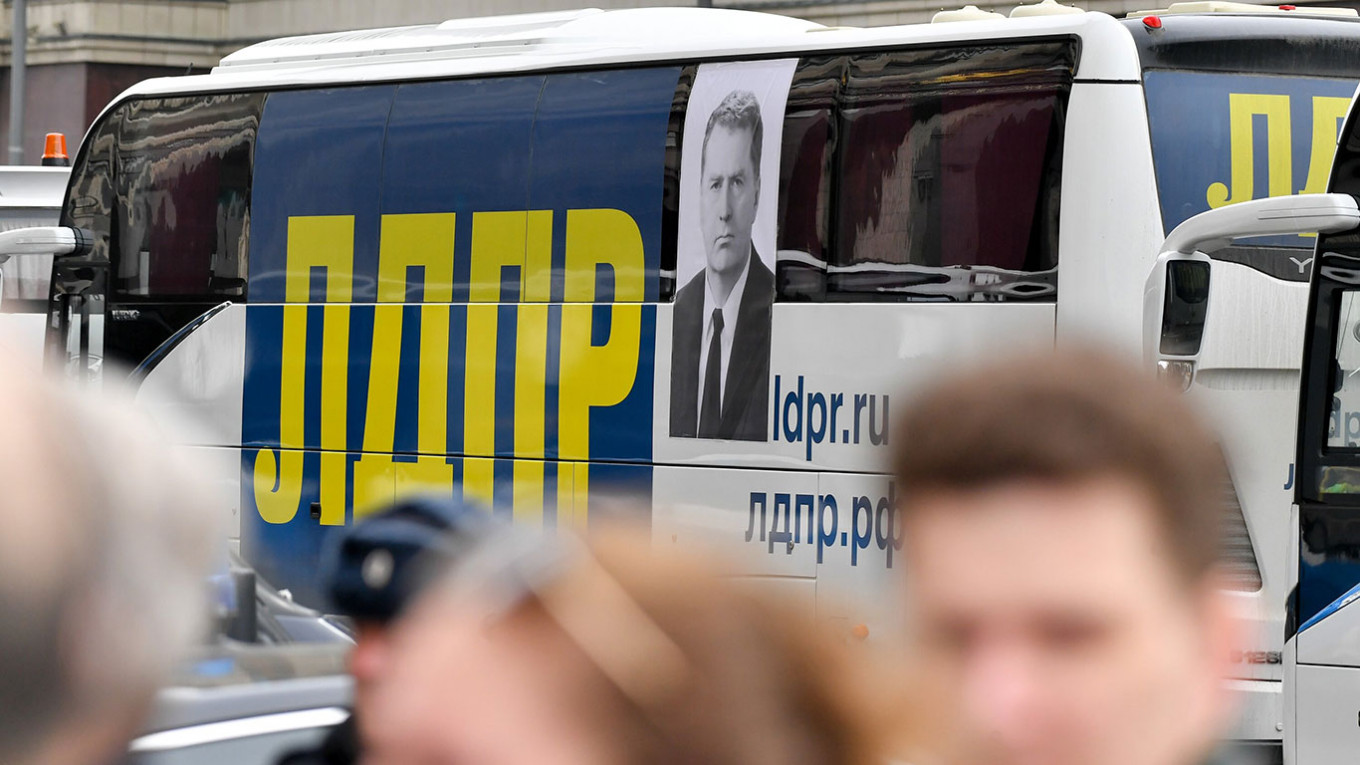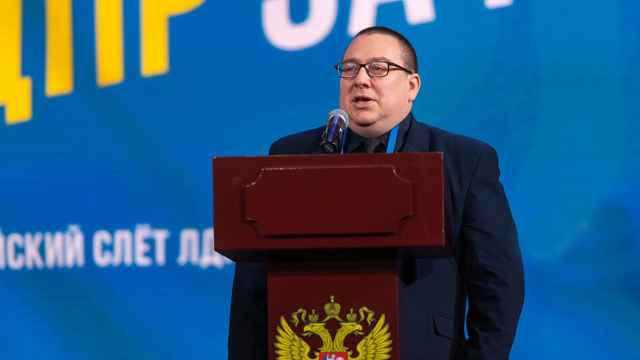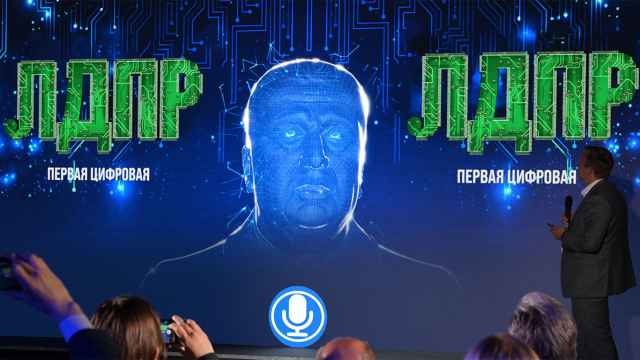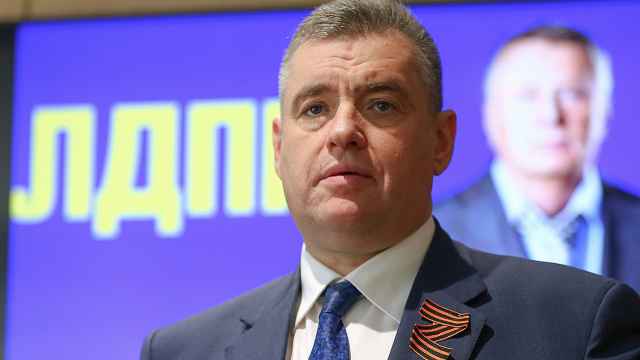The death of far-right showman Vladimir Zhirinovsky last week has fueled predictions that his Liberal Democratic Party (LDPR) could meet a similar fate.
A fixture of Russian politics since topping the polls in the 1993 parliamentary elections, the LDPR has no obvious successor to six-time presidential candidate Zhirinovsky and public support for the rabble-rousing party is waning.
“The LDPR is actually in a state of half-life. The most likely successor is failure,” political expert Alexei Mukhin told The Moscow Times.
Ultra-nationalist Zhirinovsky maintained an iron grip over the LDPR during his 32-year leadership, and was instrumental in maintaining an unspoken pact with the Kremlin that allowed the party token independence. Russian President Vladimir Putin attended Zhirinovsky’s funeral last week, and was seen whispering a message of farewell over the open coffin.
Many believe that without Zhirinovsky’s larger-than-life personality and political access, the party will fade from view.
“Although the party was ideologically far-right, it was above all a leadership party. That is why after Zhirinovsky's departure, there is an emptiness,” Andrei Kolesnikov, a political expert at the Carnegie Moscow Center, told The Moscow Times.
At the same time, the LDPR’s gradual decline has long preceded the death of its founder.
The LDPR lost 18 parliamentary deputies in the 2021 State Duma elections, their worst performance since the 1990s. They were beaten firmly into third place by the Communist Party, which has seen an influx of younger, more radical members in recent years.
Many LDPR loyalists were angered when the leadership failed to rally around then-Khabarovsk governor and party member Sergei Furgal in 2020 after he was jailed on murder charges in what was widely believed to be a politically motivated setup.
Despite scandals and disappointing election results, Zhirinovsky regularly batted away claims that he was seeking out a potential successor.
“The moment someone appears who’s better than me, or at least someone who will be as good, that person will get a chance,” Zhirinovsky said in 2016.
Once believed to be lining up his eldest son, Igor Lebedev, to take control of the party, a rift emerged between the two men following disagreements over party management. Lebedev quit politics last year.
Instead, the LDPR has announced it will take some time to deliberate over Zhirinovsky’s successor, and has appointed the head of the State Duma’s Foreign Affairs Committee, Leonid Slutsky, as an interim replacement.
“According to the regulations, the party cannot work without a leader, therefore, the decision had to be made urgently. Leonid Eduardovich [Slutsky] is a very high-status and respected deputy,” Alexandr Dyupin, an LDPR spokesman, told The Moscow Times.
Мuch like his predecessor, Slutsky’s political career has been mired in scandal.
Slutsky was at the center of Russia’s first #MeToo scandal in 2018 after a number of female journalists accused him of sexual harassment. He passed the claims off as a conspiracy.
Also rumored to be in the running for the top spot are 39-year-old deputy Alexei Didenko; deputy Andrei Lugovoi, who is wanted by U.K. police in connection with the 2006 assasination of Alexander Litvinenko; and Smolensk region governor Alexei Ostrovsky.
A more surprising name to be featured in the succession race was that of state TV propagandist and Kremlin loyalist Vladimir Solovyov.
But Solovyov dismissed claims that he was interested in the post. “I wonder who, and why, someone comes up with this nonsense time and time again?” Solovyov posted Monday on messaging app Telegram.
Russia’s invasion of Ukraine, and the LDPR’s support for the Kremlin, has consolidated Zhirinovsky’s legacy and seen new supporters flock to the LDPR, spokesman Dyupin claimed. At the very least, Russia’s aims in Ukraine align with much of the imperialist and aggressive policies advocated by Zhirinovsky in his lifetime.
“The situation in Ukraine, and the relations between Russia, NATO and the United States is developing exactly as Zhirinovsky predicted. This is 100% confirmation of Zhirinovsky's reputation as an outstanding strategist and analyst,” Dyupin said.
However, for the LDPR, a more likely consequence of the war in Ukraine and the political crackdown in Russia could be a major reworking of the current political system.
Parties like the LDPR and the Communist Party – Russia’s so-called “systemic opposition” – have long helped the Kremlin present an image of Russia as a functioning, multi-party democracy, while siding with the authorities on key issues.
“Everything is heading toward the systemic opposition ceasing to exist in the form in which we are used to seeing it,” political analyst Tatiana Stanovaya wrote on Telegram last week.
Others believe that parties like the LDPR will see a slow decline, deprived of funding and patronage until they become politically irrelevant.
“The entire quasi-party system needs to be restructured,” said Kolesnikov.
A Message from The Moscow Times:
Dear readers,
We are facing unprecedented challenges. Russia's Prosecutor General's Office has designated The Moscow Times as an "undesirable" organization, criminalizing our work and putting our staff at risk of prosecution. This follows our earlier unjust labeling as a "foreign agent."
These actions are direct attempts to silence independent journalism in Russia. The authorities claim our work "discredits the decisions of the Russian leadership." We see things differently: we strive to provide accurate, unbiased reporting on Russia.
We, the journalists of The Moscow Times, refuse to be silenced. But to continue our work, we need your help.
Your support, no matter how small, makes a world of difference. If you can, please support us monthly starting from just $2. It's quick to set up, and every contribution makes a significant impact.
By supporting The Moscow Times, you're defending open, independent journalism in the face of repression. Thank you for standing with us.
Remind me later.







